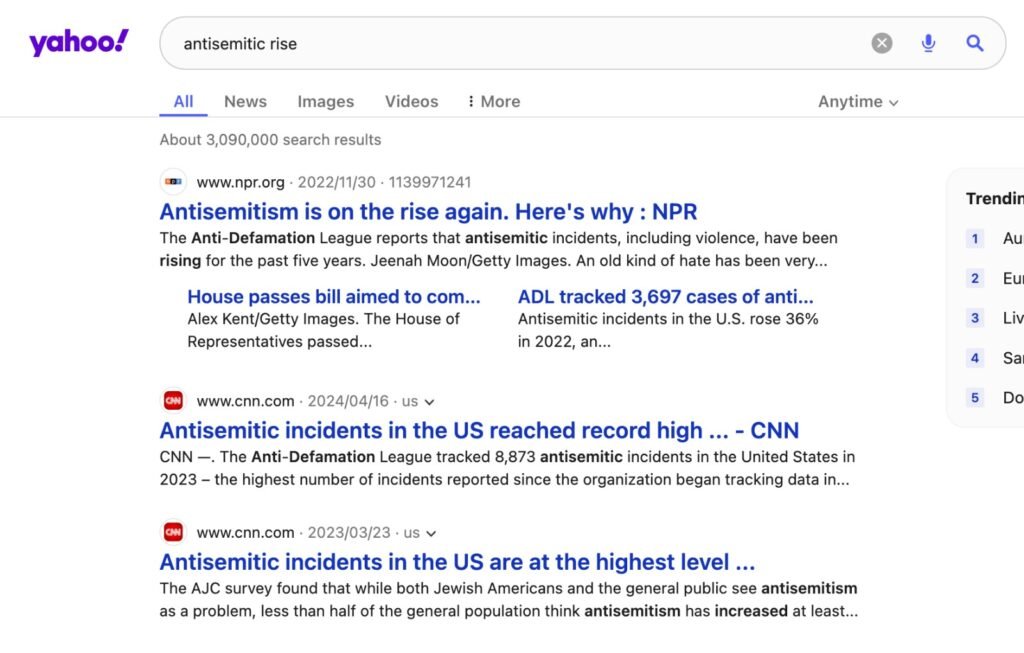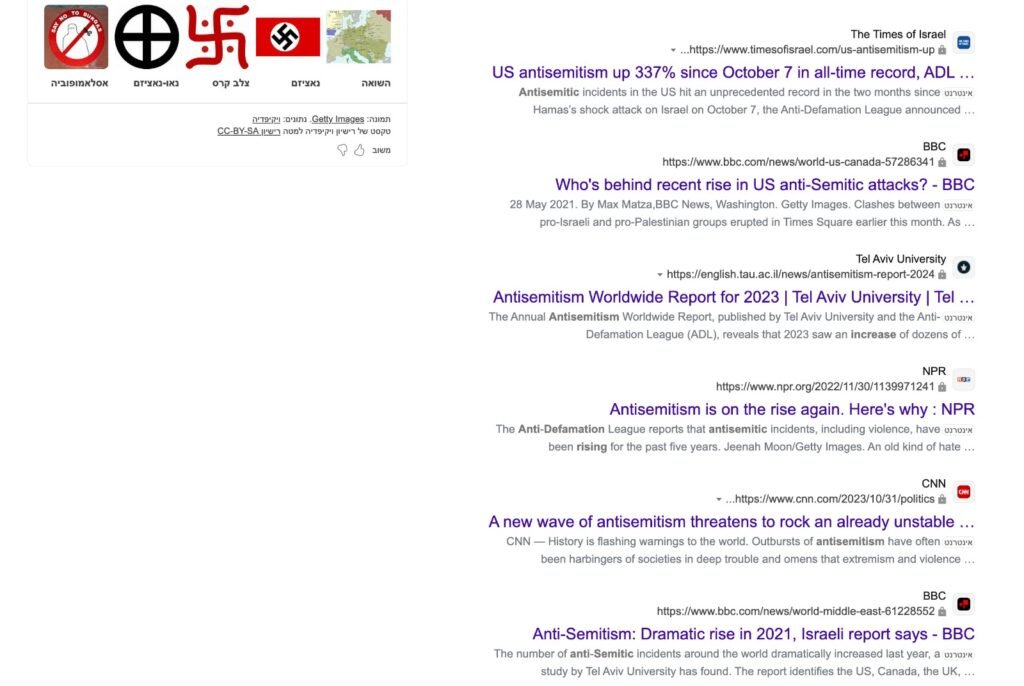Leveraging SEO to Combat Antisemitism: Exploring Perspectives Across Google, Bing, and Yahoo
- By Shay Menashe Levy
- 12 May 2024

In a digital age where truth can be elusive, I delved into the labyrinth of search engine results to uncover insights on the alarming surge in antisemitic incidents. Join me on a journey through Google, Bing, and Yahoo as we navigate the complex web of information surrounding this pressing issue.
Google: Peering into the Heart of the Matter
As the gatekeeper of the digital realm, Google unveiled a mosaic of perspectives on antisemitic rise. From the ADL’s stark statistics to Axios’ analytical lens, each click peeled back layers of insight, revealing the multifaceted nature of this troubling trend.
1. ADL Press Release: Google’s top result was from the Anti-Defamation League (ADL), highlighting a staggering 360% increase in antisemitic incidents in the U.S. This article provided detailed insights into the rise of antisemitism, particularly after the Hamas attack.
2. ADL Report: Another link from the ADL presented an audit of antisemitic incidents in 2022, shedding light on the link between antisemitic attitudes and activities.
3. Axios Article: Google also featured an Axios article discussing the surge in antisemitic incidents in the U.S. following the Hamas attack, providing context and analysis.

Yahoo: Navigating Legislative Frontiers
Yahoo’s search results led me through the corridors of power, where legislative efforts to combat antisemitism took center stage. With NPR as our guide, we explored the House of Representatives’ groundbreaking bill and the nuanced debates surrounding its implementation.
1. NPR Article: Yahoo prominently displayed an NPR article discussing the rise in antisemitic incidents reported by the ADL over the past five years, providing context and analysis.
2. NPR Coverage: Another NPR article highlighted the U.S. House of Representatives’ passage of a bill aimed at combating antisemitism, underscoring legislative efforts to address the issue.
3. CNN Report: Yahoo also featured a CNN report on the ADL’s tracking of over 3,600 cases of antisemitic harassment in the U.S. and the alarming 36% rise in antisemitic incidents in 2022.

Bing: Unearthing Global Perspectives
Bing’s search results transported us beyond borders, offering a panoramic view of antisemitic rise on the world stage. From Tel Aviv University’s comprehensive report to the BBC’s investigative prowess, we gained a deeper understanding of this complex phenomenon’s global impact.
1. Times of Israel Article: Bing’s top result was from The Times of Israel, discussing the 337% increase in U.S. antisemitism since October 7, marking an all-time record according to the ADL.
2. BBC Coverage: Bing also featured a BBC article exploring the recent surge in anti-Semitic attacks in the U.S. and efforts to identify those responsible.
3. Tel Aviv University Report: Additionally, Bing highlighted a report from Tel Aviv University and the ADL on the worldwide increase in antisemitism in 2023, providing a global perspective.

From these search results, it’s evident that while all three search engines provide access to information on antisemitic rise, the specific articles and sources highlighted vary.
Google emphasizes news outlets like Axios, CBS News, and CNN, while Yahoo tends to feature NPR articles prominently. Bing, on the other hand, showcases sources like The Times of Israel, BBC, and Tel Aviv University.
The differences in search results underscore the importance of critical thinking and cross-referencing information from multiple sources to gain a comprehensive understanding of complex issues like antisemitism. As consumers of information, we must be vigilant in navigating the digital landscape and recognizing the potential biases and limitations of search engine algorithms.
So what can israel do?
Israel can leverage search engine optimization (SEO) strategies to counteract antisemitism and promote a more accurate and balanced narrative online. Here are some marketing tactics Israel can employ:
1. Create Educational Content: Develop informative and engaging content that educates audiences about Judaism, Israeli culture, and the history of antisemitism. This content can include articles, videos, infographics, and educational resources that debunk myths and misconceptions about Jews and Israel.
2. Optimize Website and Content: Utilize SEO best practices to optimize Israel’s official websites, blogs, and online resources for relevant keywords related to Judaism, Israeli identity, and antisemitism. By incorporating targeted keywords into website content, meta tags, and headers, Israel can improve search engine rankings and increase visibility for important information.
3. Engage with Online Communities: Actively participate in online forums, social media groups, and community discussions to engage with audiences and address misinformation or antisemitic rhetoric. By providing accurate information and fostering constructive dialogue, Israel can combat negative stereotypes and promote understanding.
4. Partner with Influencers and Advocates: Collaborate with influencers, bloggers, and advocates who are passionate about fighting antisemitism and promoting tolerance. These individuals can amplify Israel’s messaging and reach new audiences through their online platforms and social networks.
5. Utilize Social Media Platforms: Leverage social media platforms like Facebook, Twitter, Instagram, and YouTube to share compelling content, engage with followers, and raise awareness about antisemitism. By regularly posting updates, sharing news articles, and participating in relevant conversations, Israel can maintain an active presence and influence public opinion.
6. Monitor and Respond to Online Activity: Implement tools and systems to monitor online activity, track mentions of Israel and antisemitism, and identify emerging trends or issues. By staying informed and proactive, Israel can quickly address misinformation or hateful content and mitigate its impact.
7. Collaborate with Government and NGOs: Partner with government agencies, non-profit organizations, and advocacy groups to coordinate efforts and share resources in the fight against antisemitism. By working together, Israel can amplify its message and mobilize support from diverse stakeholders.
8. Educational Campaigns and Initiatives: Launch targeted educational campaigns and initiatives that raise awareness about antisemitism, promote tolerance, and empower individuals to take action. These campaigns can include online ads, public service announcements, and educational resources distributed through schools, community centers, and religious institutions.
By implementing these marketing strategies and leveraging the power of SEO, Israel can effectively combat antisemitism, promote positive narratives, and foster a culture of tolerance and understanding online. By engaging with audiences, sharing informative content, and collaborating with partners, Israel can make a meaningful impact in the fight against hate and discrimination.

marketing strategy

Analytic

Creative content

Social Media

Communities

Business branding

Ui UX Design

Web Developer

graphic design


